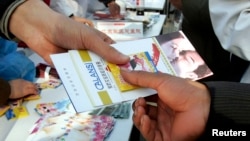China has a relatively low prevalence of HIV positive citizens, with fewer than point-one (0.1) percent of adults infected. But the number of AIDS cases continues to rise, and health advocates blame a lack of education and prevention.
The number of people with HIV in China is fairly low given the size of the population. According to official statistics, 800,000 Chinese are living with HIV, but health officials are concerned about a rise in HIV transmission, particularly among the young.
According to Chinese state media, more than 70,000 new cases of HIV were identified in 2013, and infection rates are rising among teenagers and young adults.
“What we are have seen over the past few years is a quite significant shift in where infections are happening," explains Dr. Bernhard Schwartlander, the World Health Organization's (WHO) representative in China. "Where as initially the majority of infections happened through blood transfusion and blood donations situations and injecting drug use. Today the vast majority of cases is transmitted through sexual transmission, both heterosexual and homosexual, that means sex between men.”
Chinese authorities estimate nearly 90 percent of new infections occur through sexual contact.
Economic development, urbanization
Dr. Schwartlander attributes the rise in sexual transmission to economic development and urbanization. Hundreds of millions of China’s migrant workers are in the process of moving from the countryside to the cities. It’s the largest mass migration of human beings in history.
“China is going through a very traumatic social and economic change, which brings very good things, and also brings very difficult and challenging things. It brings risks in health, and also increasing opportunities to engage in risky behavior, and also transmitting HIV,” said Schwartlander.
As young people move away from the countryside in search of more lucrative work, the transition can be an abrupt cultural change. The doctor said that many are not fully prepared for the shift in lifestyle.
“That is a situation we have seen in many cities, particularly bigger cities, where a new sub culture is emerging with a new freedom. People can come together, people can get together, but also it offers opportunities for engaging in sexual activity, and unfortunately the prevention education hasn’t kept pace many places with these realities.”
Lack of knowledge
While China’s economic development has brought people more opportunities to congregate and socialize, many in the country still know little about HIV. Schwartlander says only half of HIV carriers in the gay community know they have the virus. Many wait to seek treatment until the disease has progressed.
Xiaogang Wei organizes an AIDS Walk every year in Beijing to raise money for prevention of HIV and AIDS. He said people with HIV face a lot of stigma in China, which prevents them from talking openly about the disease and learning how to prevent and seek treatment. “Of course there are a lot of problems. There are still people getting fired because they have HIV," he noted. "People get rejected at school, because they have HIV.”
Stigma and prejudice
Dr. Schwartlander said that even at China’s hospitals, HIV patients face prejudice. Many in China fear the disease is contagious and can be spread through sharing food or drink, so doctors can be reluctant to treat HIV carriers for fear of scaring off other patients and losing revenue for the hospital.
“There is a fairly high level of discrimination and stigma, including in the health sector. That is particularly important because people feel they are stigmatized, discriminated against at the places where they should get help, they don’t go there,” he explained.
State news media reported that Chinese leaders are renewing their focus on the disease, in part through increased state funding for treatment, but also by reaching out to local health groups.
Civil society organizations hope this will give them more power to help China’ fight against the disease. But Maya Wong, of Human Rights Watch, is skeptical. “The government on the one hand has been quick to deal with the AIDS crisis through providing access to medical care, however there are still obstacles. On the other hand it continues to obstruct efforts and harass activists who try to have an honest discussion on how to control the spread of AIDS,” she said.
One Chinese activist, Ye Haiyan, who lobbies for the rights of sex workers, was denied permission by Beijing to travel to this week’s International AIDS Conference in Melbourne, Australia.
China’s government may decide it needs activists’ help in fighting the disease. The WHO has said that high rates of HIV amongst gay men threatens progress in the battle against AIDS worldwide, arguing that although these men are at high risk of becoming infected, they are also least likely to seek prevention and treatment services.




